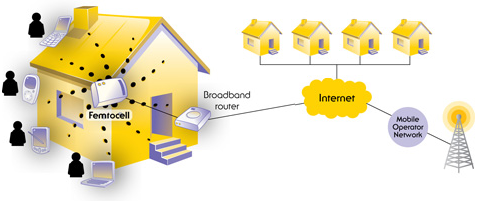Femtocells: your very own home cell network

Besides the "femtocell" sounding like a robotic sex toy or an individually wrapped feminine hygiene product, in technological terms it is a router-like device which converts a portion of your broadband bandwidth to provide you with a compact cell network in your house.
The concept is a relatively simple one. You buy a femtocell from your mobile network operator, because if you were on Verizon and bought a T-Mobile one, that would be pretty pointless. You switch it on, plug it into your broadband router, and as simple as that, you have cell signal.
In the recently built postgraduate college on the University of Kent's Canterbury campus, students were left without phone signal due to the lack of cell transmitters in the area and a building which was designed, almost to withstand the blast of a nuclear explosion.
For many living in hilly areas, especially but not exclusively in England, will find that cell signal can be patchy from room to room.
Another use for femtocells would be trains and railways. Not only do phone users struggle to maintain a phone call travelling at 130mph through the countryside, but the constant barrage of tunnels makes it difficult to maintain a connection. As many trains now have wireless Internet access for mostly business users, adding a femtocell to the center of the train would ensure a constantly connected phone-to-cell network.
Some large network operators are already supporting femtocells and offering them to consumers. But the problem lies when multiple family members use different phone operators.
As broadband routers often provide a home network of speeds around 2-4MB speeds, the increasing number of devices connected to routers are slowing the overall network down. Femtocells often have QoS (quality-of-service) which allows a dedicated stream of bandwidth to the device. So even if you've got someone on the Xbox, somebody else streaming from YouTube, and a number of torrents downloading, you are ensured a good quality connection when using your phone through the femtocell.
Are femtocells an emerging technology you would like to jump on the bandwagon of, or another catchy gimick which won't make its way past Christmas?
